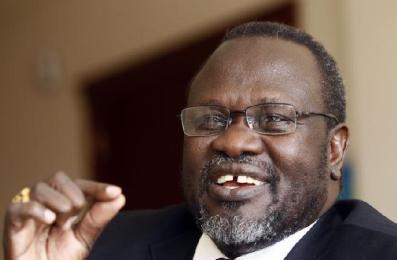Rebels slam Juba’s arguments over leadership structure as “irrational”
February 15, 2015 (ADDIS ABABA) – South Sudanese rebel group, SPLM-IO, led by former vice-president Riek Machar said government’s arguments against a proposed leadership structure during a period of transition were irrational and indicative of lack of seriousness to restore peace and stability in the young country.

The regional body further confirmed president Kiir as the leader of the would-be transitional government of national unity, to be deputised by his former vice-president, Riek Machar, as first vice-president, while the incumbent James Wani Igga, who replaced Machar in July 2013, would take the second vice-presidency position.
IGAD presented the proposal to the two warring parties in the recent Addis Ababa summit of heads of state and government to try to end the 14-month old war in South Sudan.
President Kiir however publicly rejected the proposal, saying it was “unconstitutional” and he was not also ready to “reward rebellion” led by Machar with the proposed position of first vice president.
Also leading politicians from greater Equatoria region from which Igga hails, including national cabinet affairs minister, Martin Elia Lomoru and three governors of Central, Western and Eastern Equatoria states have been vocal in rejecting any attempt to replace Igga whom they see as their Equatorian top executive leader.
Juba instead preferred to propose the creation of two positions of vice-president with equal status, one for the rebel leader Machar and the other for the incumbent vice president Igga.
Rebel official however said even though his leadership was consulting with their constituency on the IGAD proposal, he said the government’s declared “intransigent” position showed lack of seriousness to bring peace.
“I don’t think they are serious to restore peace and stability in the country. Their arguments on unconstitutionalities are irrational and inconsistent,” Machar’s spokesman, James Gatdet Dak, told Sudan Tribune on Sunday.
He argued that the transitional constitution was supposed to be for the interest of the people of South Sudan, which he said was to restore peace and stability and introduce better governance system and reforms.
Dak explained that amending the current transitional constitution or making permanent constitution would ensure and facilitate restructuring of the state and implementing reforms.
“The argument that creation of first vice-president position was unconstitutional was inconsistent with the government’s own proposals,” he said.
The rebel leader’s spokesman pointed out that even the two positions of vice-president with equal status which president Kiir’s government proposed was not provided for in the transitional constitution.
“Why would they be proposing creation of two positions of vice president with equal status which is not provided for in the constitution when at the same time they reject creation of positions of first vice president and vice president? Is this not a serious inconsistency and defect in their arguments?” he inquired.
He further argued that if the same transitional constitution could allow the government to create two positions of equal vice presidents in status, it could also allow to create positions of first vice president and vice president with seniority on the basis of a peace agreement.
He also dismissed petition by some senior politicians from Equatoria region which called to maintain their “son” Igga as vice president, saying vice president Igga was not elected to the executive position by the people of Equatoria in order to only represent them or be maintained by them.
JUBA NOT RESPECTING CONSTITUTION
Dak further challenged government’s claims to be respecting the provisions of the constitution, citing as an example failure to conduct state elections in four states of Lakes, Unity, Northern Bahr el Ghazal and Jonglei where elected governors have been replaced with unelected caretakers.
He said this was “a serious violation of the transitional constitution”, which clearly stipulated that gubernatorial elections in the affected states were supposed to be carried out within 60 days from the date a caretaker governor was appointed by the president.
The rebel spokesperson further said it was unavoidable to either make amends to the current transitional constitution or make a permanent supreme law of the land that would incorporate provisions from the would-be final peace agreement.
IGAD provided the stakeholders with timeframe to make consultations with their respective constituencies until 20 February.
The conflicting parties are due to return to Addis Ababa on 19 February in order to agree on leadership structure and power-sharing.
Many other outstanding issues on governance, security arrangements, reforms, wealth-sharing, justice, accountability and reconciliation are yet to be negotiated.
The parties are given5 March dateline to sign a final peace agreement, begin a three-month pre-transitional period on 1 April to organize themselves and form a government of national unity by 9 July.
Regional and international communities have threatened targeted punitive measures if the warring parties fail to reach a final peace agreement per the schedule.
The war erupted on 15 December 2013 when political debates on reforms within the leadership of the ruling Sudan Peoples’ Liberation Movement (SPLM) turned violent between president Kiir and his former vice-president Machar.
Tens of thousands have been killed, 2 million displaced internally and to the neighbouring countries of Uganda, Kenya, Ethiopia and Sudan while over 3 million others are threatened by hunger and diseases internally.
(ST)
